PureVPN Review: Quick Expert Summary
PureVPN has good security features, pretty fast speeds, and a large server network. It also has good streaming support and competitive pricing plans, but there are honestly much better VPNs out there like ExpressVPN.
PureVPN comes with industry-standard VPN security features like 256-bit AES encryption, a kill switch, full leak protection, perfect forward secrecy, and a no-logs policy that’s been independently audited and verified. In my speed tests, PureVPN maintained fast speeds for browsing, torrenting, and streaming on local and nearby servers.
Also, I like that PureVPN works with most of the top streaming services like Netflix, Disney+, and BBC iPlayer, comes with split-tunneling, and works in restrictive countries like China and Iran.
Plus, it’s one of the few VPNs that has a dedicated Apple TV app. Most VPNs make you use a smart DNS feature, which doesn’t protect your data, or have you set it up or your router to use Apple TV.
While I was impressed with PureVPN, there are still many areas that need improvement. For example, PureVPN doesn’t have advanced security features like RAM-only infrastructure, and you have to pay extra for security features like DDoS protection and port forwarding — other top VPNs like Private Internet Access include DDoS protection and port forwarding in their regular subscription price. Plus, PureVPN only allows P2P traffic on servers in 30+ countries, causes noticeable slowdowns on some remote servers, its live chat reps can’t answer advanced questions, and its email support is not always helpful.
PureVPN allows up to 10 simultaneous connections, and it has reasonably-priced monthly and yearly plans, which are all backed by a 31-day money-back guarantee.
| 🏅 Overall Rank | #31 out of 82 VPNs |
| 🌍 Servers | 6,075 |
| 📱 Number of Devices | 10 |
| 💸Starting Price | $2.14 |
| 🎁 Free Plan | ❌ |
| 💰 Money-Back Guarantee | 31 days |
PureVPN Full Review — Has the Essentials, but It Charges Extra for Some Basic Features
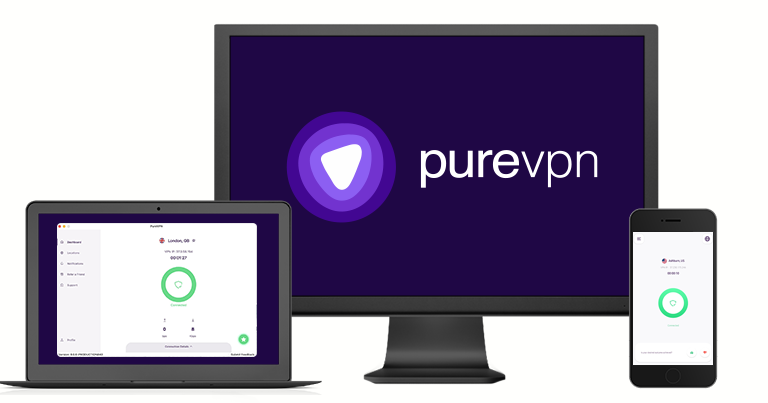
I spent a few weeks testing all of PureVPN’s features to see if it has good security, fast speeds for all online activities, easy-to-use platforms, and whether or not it’s good for streaming and torrenting.
PureVPN has all of the essential VPN security features, including full leak protection, perfect forward secrecy, fast speeds on local servers, and good torrenting and streaming support — and even comes with split-tunneling.
However, it’s missing a lot of things that prevent it from competing with the top VPNs like ExpressVPN and Private Internet Access — it lacks RAM-only servers, speeds on distant servers are slow, it charges extra for some basic features (DDoS protection and port forwarding), and torrenting is only allowed on dedicated servers.
Overall, PureVPN is a decent VPN that does a lot of things well, but it’s not a great value when compared to the best VPNs on the market.
PureVPN Plans & Pricing — Very Cheap Yearly Plans
PureVPN offers monthly and yearly pricing plans. It lets you connect up to 10 devices simultaneously (the industry average is 5-7), which is great for households with a lot of devices. It also offers monthly business plans, which base their cost depending on the size of your team.
PureVPN’s monthly plan is competitive with other top VPNs, but its yearly plans are very cheap. PureVPN’s most affordable plan costs just $2.14 / month. That being said, VPNs like ExpressVPN, Private Internet Access, and CyberGhost VPN offer a much better value than PureVPN — they all have better security and privacy features, faster speeds, more extra features, and work with all of the top streaming sites.
PureVPN splits its plans into 3 options based on the extra features available. The Standard plan includes only the VPN and is the cheapest option, and it also has a “Family Plan” upgrade option that allows you to create 5 separate VPN accounts for friends and family. There’s a small discount when purchasing 5 accounts this way compared to purchasing 5 individual Standard plans.
The Plus plan includes the VPN, PureKeep, a password manager, and PureEncrypt, which provides cloud storage and end-to-end encryption. The most expensive plan, Max, includes everything in Plus, as well as PurePrivacy, which helps you protect your social media and privacy, disable online trackers, and otherwise safeguard your online data.
There are also some optional add-ons with any PureVPN plan. If purchasing the Standard plan, you may choose to add any of the features available in the Plus and Max plans individually. For example, if you wanted the password manager but not PureEncrypt, you could add it individually to save money. When purchasing any of the plans, you can also purchase a dedicated IP, port forwarding, a dedicated server, or a bundled dedicated IP and port forwarding (PowerPack).
PureVPN accepts major credit cards, Google Pay, PayPal, and payments through Paymentwall, and each plan is backed by a 31-day money-back guarantee.
Overall, PureVPN has low-cost monthly and yearly plans, but these plans don’t offer the same value as many of the best VPNs on the market.
PureVPN Features — A Decent Range (But Some Are Paid Add-Ons)
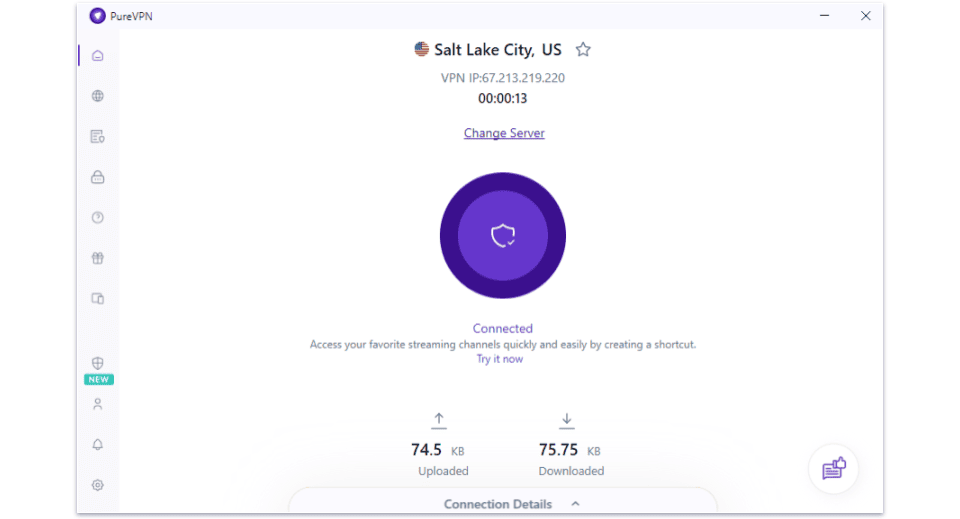
PureVPN provides the following industry-standard VPN security features:
- 256-bit AES encryption — PureVPN uses bank-grade encryption to keep your data secure.
- No-logs policy — PureVPN’s no-logs policy has been independently audited and verified — it doesn’t collect your IP address or online traffic (files you download and websites you visit).
- Kill switch — PureVPN’s kill switch disables your internet if your VPN connection goes down, preventing accidental IP address leaks.
PureVPN provides access to the WireGuard, OpenVPN (UDP and TCP), and IKEv2/IPSec protocols. It also has a protocol called “Proxy” that, like the name implies, is just a proxy connection. That means it changes your IP address to hide your location, but it doesn’t encrypt your traffic — so you get very fast speeds, but no security.
I like that PureVPN has perfect forward secrecy, which changes the encryption key for each VPN session to prevent hackers compromising past or future keys and using them to spy on your traffic. But it’s a shame it’s missing RAM-only servers, which wipe all data upon reset, like ExpressVPN and Private Internet Access have.
PureVPN comes with full leak protection (IPv6, DNS, and WebRTC), which is good, as some VPNs, like VyprVPN, force you to manually disable IPv6 and WebRTC. I conducted leak tests on servers in over 10 countries and found no leaks.
PureVPN also provides some additional features:
- Split-tunneling (for Android, Windows, Android TV, and Fire TV). This feature allows you to choose which apps are routed through the VPN connection and which apps are routed through your local connection. PureVPN’s split-tunneling tool is very simple to use, and it’s similar to ExpressVPN and CyberGhost VPN, which both only allow you to exclude apps. While PureVPN’s split-tunneling app works as intended and is very easy to use, I prefer Private Internet Access and Proton VPN’s split-tunneling instead — both providers allow you to exclude apps and IP addresses (which essentially lets you redirect specific websites).
- DDoS protection (for a small additional cost). This security feature is useful for gamers who may be targeted with a DDoS attack, which forces users offline or slows down their network connection speeds. I always use DDoS when I play video games, and I like that PureVPN offers this security feature, but I don’t like that I have to pay extra for it. The best gaming VPNs, like ExpressVPN and CyberGhost VPN, include DDoS in their subscription price.
- Shortcuts (for iOS, Android, Windows, and Android TV). Allows you to create 1-click shortcuts for certain streaming sites and VPN servers. The feature is simple to use — just pick a streaming service from PureVPN’s predefined list, tap on the shortcut, and it will automatically connect you to a compatible server and then open the streaming platform’s site. This feature works well, but I like ExpressVPN’s Shortcuts feature more, as it allows you to create 1-click shortcuts for any app or site you want — such as less popular streaming sites like Pluto TV (which is not present in PureVPN’s predefined list), video games, or banking apps.
- Tracker Blocker. This feature blocks ad trackers, so they can’t follow your online activities and learn your personal information. It stops trackers from communicating with their owners, so they can’t share any data they collect. It’s still in its BETA version, so it’s not totally reliable yet, and it’s only available on Windows.
PureVPN Privacy & Security — Verified No-Logs Policy & Privacy-Friendly Location
PureVPN has a strict no-logs policy — it doesn’t monitor your IP address, bandwidth, or traffic (such as the websites you visit or the files you download). It only stores your name (to identify you), email address (for support and communication), and payment method (to process subscriptions) at signup.
PureVPN’s no-logs policy has been independently audited and verified multiple times (like ExpressVPN and TunnelBear). But I also think it’s really cool that PureVPN has an “always-on” audit policy, which means that PureVPN’s contracted security firm (KPMG) can audit PureVPN’s policy at any time without prior notice.
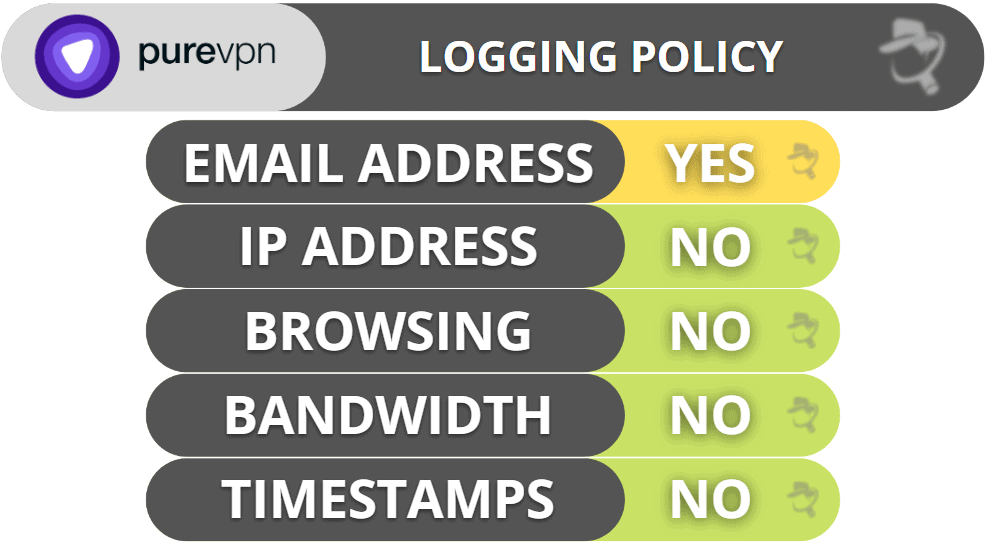
PureVPN is headquartered in the British Virgin Islands, which is not a member of the 5/9/14 Eyes Alliances (a group of countries that share surveillance data).
Overall, PureVPN has a transparent no-logs policy that’s been audited and is headquartered outside of the jurisdiction of 5/9/14 Eyes Alliances.
PureVPN Speed & Performance — Fast on Local Servers, Some Slowdowns on Distant Servers
I tested PureVPN’s speed on a server in all 66 countries where it has a server using my Windows 11 PC. I was pleasantly surprised to see that PureVPN maintains very fast speeds on nearby and some distant servers. However, I experienced noticeable slowdowns on most distant servers.

Overall, PureVPN maintains fast speeds on local servers, but there are slowdowns on distant servers. On nearby servers in the US, HD videos on YouTube started almost right away and only had minor buffering, P2P files downloaded very fast, and websites took 1–2 seconds to load. However, when I connected to a server in Germany and Ireland, websites took up to 5 seconds to load and HD videos started in 15 seconds (but played without any buffering once they started). But I maintained pretty fast download speeds — I downloaded a 20 GB file in about 35 minutes, which is good.
PureVPN Servers & IP Addresses — Great Server Network With Ping Displayed
PureVPN has 6,075 servers in 66 countries — this is a very impressive server network, which allows users in most parts of the world to connect to a nearby server to get fast speeds and lower pings. While other VPNs have servers in many more countries (Private Internet Access has servers in 91 countries, and ExpressVPN and CyberGhost VPN both have servers in 100+ countries), PureVPN’s server network is still larger than top competitors like TunnelBear (47).
Also, I like that PureVPN allows you to select servers by city in major locations like the US, UK, Germany, Australia, and others countries — this allows you to connect to cities in those countries that are closest to your location. I’m happy to see that PureVPN displays the server ping to help you select the fastest server location — and it’s very accurate. In my speed tests, the pings I got were usually very close to PureVPN’s ping estimates.
PureVPN allows torrenting on dedicated P2P servers in 30+ countries and makes it easy to find these servers as it marks them “P2P” in the server list. While the dedicated torrenting servers worked well and provided good download speeds, there are better torrenting VPNs around, like ExpressVPN and Private Internet Access, which both support P2P traffic on every server.
The provider also has Quantum Resistant servers in 66 countries that future-proof user data against potential future quantum threats, which could compromise current encryption standards once quantum computing becomes more advanced. PureVPN’s Quantum Resistant servers use quantum-resistant encryption keys, which can’t be compromised by quantum threats. While you don’t really need this level of security for now, I’m still happy to see that the provider is looking into ways to secure user data in the future.
PureVPN also provides dedicated IP addresses from 10 different countries, but dedicated IPs cost extra. Dedicated IP addresses are IP addresses that are assigned only to you — this is good for minimizing the risk of being blacklisted by your bank’s website or if your workplace portal only allows access to selected IP addresses. Private Internet Access and CyberGhost VPN also offer dedicated IP addresses at an additional cost, but PrivateVPN offers dedicated IPs for free. You could also purchase a dedicated server (available in 18 countries), which provides access to more than 30 dedicated IPs.
Overall, PureVPN has a great server network, displays the server ping to help you find the fastest server, allows torrenting on optimized servers in 30+ countries, and offers dedicated IP addresses for a small additional price.
PureVPN Streaming & Torrenting — Pretty Good for Both
PureVPN is good for streaming, but it has some limitations — it works with top streaming platforms like Hulu, Disney+, and BBC iPlayer, as well as less popular ones like Rai TV, VRV, and Sony Crackle. It only works sometimes with Netflix (you may get the proxy error), and it doesn’t work with Amazon Prime.
I recommend ExpressVPN for watching content on Netflix and all other streaming sites. ExpressVPN works with 100+ streaming sites and has blazing-fast speeds on all servers.
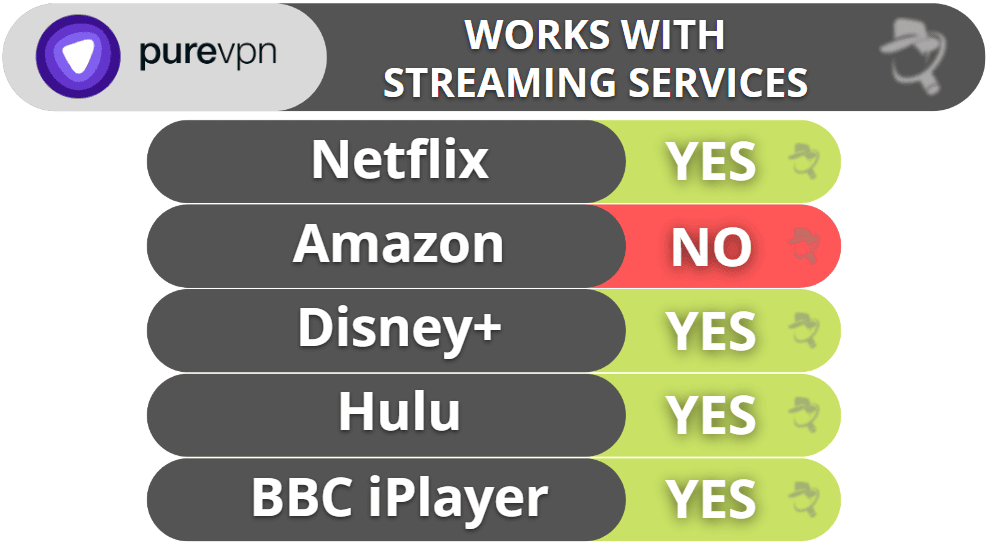
PureVPN is also good for torrenting. It has specialized P2P servers that are optimized to provide fast speeds for downloading files, works with top torrent clients like uTorrent, Deluge, and BitTorent, and you can add port forwarding (allows you to connect to more peers for faster speeds) for an additional cost.
I still think there are much better torrenting options out there — for example, ExpressVPN allows torrenting on all servers in 105 countries and has some of the fastest speeds on the market, and Private Internet Access also allows P2P traffic on all of its servers and includes port forwarding in its subscription price.
Overall, PureVPN is good for both streaming and torrenting. It works with Netflix and other popular streaming websites (but not Amazon Prime), and it allows torrenting on dedicated P2P servers in 30+ countries.
PureVPN Ease of Use: Mobile & Desktop Apps — Simple & Reliable Apps
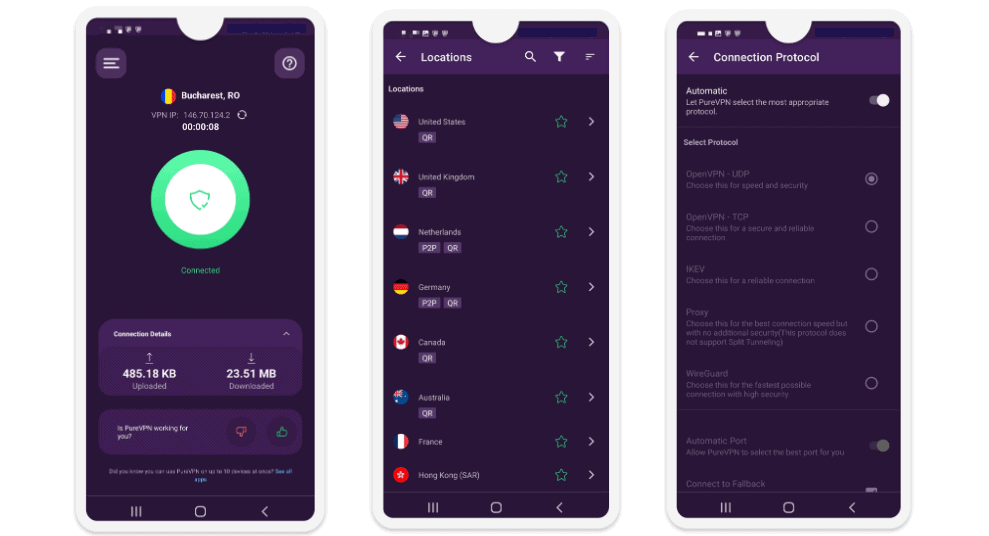
PureVPN offers apps for all major OS, including Android, iOS, Windows, macOS, Linux, and Fire TV, as well as browser extensions for Edge, Firefox, Brave, and Chrome. It’s also one of the few VPNs on the market that has a dedicated app for Apple TV.
The mobile apps are simple and intuitive. I like the quick-connect feature and it’s very easy to manually connect to a server — there’s a search field and you have options to sort the list of countries in alphabetical order, popularity, ping, and even filter P2P servers. Unfortunately, PureVPN’s iOS app doesn’t support split-tunneling or a kill switch, but even some of the best VPNs for iOS lack these features (Private Internet Access has a good kill switch for iOS). However, it does have “Personalize server selection”, which means the VPN connects you to the same servers that have previously provided strong connections. It also has a built-in speed test and “VPN on Demand”, which tells the VPN to auto-connect when you visit specified websites in your iPhone’s browser.
PureVPN’s desktop apps have a very similar design to the mobile apps — there’s a quick-connect feature, the settings are easy to understand and configure, and you get split-tunneling on Windows. I also like the available automations. You can set the VPN to automatically launch when you open your computer or connect to a specific server when you launch the app. Still, I prefer CyberGhost VPN’s Smart Rules since it has more automations.
Its dedicated Apple TV app is user-friendly, too. The design is similar to that of the PureVPN mobile and desktop apps, so it’s very easy to find and connect to any server, including servers in different cities for some locations. I like how the app shows you the most recent server you connected to on the home screen and how it even lets you mark servers as Favorites for quick access. PureVPN’s Apple TV app has a Recommended Locations option as well, which includes the fastest servers for your location. Considering that most VPNs don’t have a dedicated app for Apple TV, I’d say PureVPN’s is feature-rich and pretty much on par with the Android TV app.
Overall, PureVPN has simple mobile and desktop apps that provide easy navigation and reliable functionality, and a pretty great Apple TV app.
PureVPN Customer Support — Pretty Good Overall
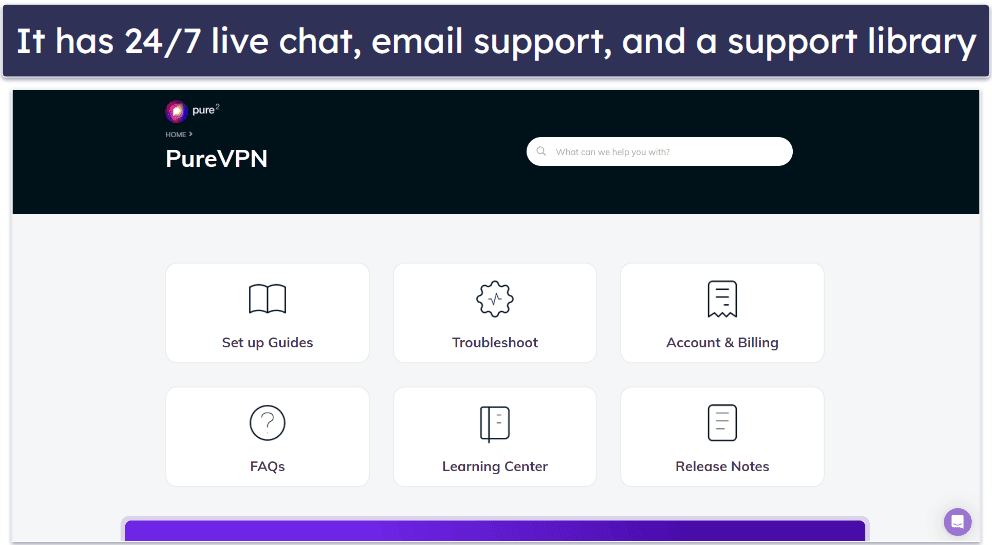
PureVPN offers satisfactory support through various means: 24/7 live chat, email, tickets, and a comprehensive library.
PureVPN provides a vast number of support materials for troubleshooting, frequently asked questions (FAQs), and setup guides that include step-by-step instructions and images. That said, I like ExpressVPN’s support library slightly better because it also has video guides, which are really convenient.
I tested the provider’s live chat multiple times, and I generally had a good experience. The reps were pretty knowledgeable and were always able to answer my questions, but only as long as I asked basic questions about streaming, the kill switch, or torrenting — they weren’t able to answer advanced questions about perfect forward secrecy and RAM-only servers. Also, I don’t like how, sometimes, it takes a few minutes to be connected to a live chat rep. With ExpressVPN and CyberGhost VPN, I’m usually connected to a rep in just a few seconds and their reps can also answer advanced questions.
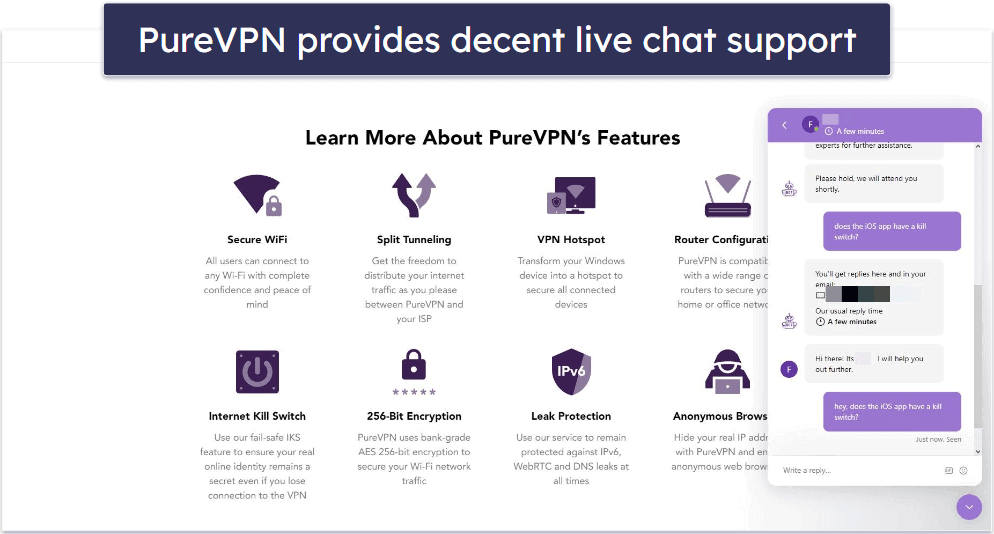
I also tested the ticketing system by opening several support tickets — I usually received a helpful response in 2–3 hours.
I tested the email support by sending multiple queries over a week. Responses generally arrived within 4 hours. While most answers were helpful, a few weren’t detailed enough, and my follow-up questions went unanswered.
Overall, PureVPN’s customer support is good, as you get an in-depth support library, and helpful 24/7 live chat and a good ticketing system — but I wish the live chat reps could answer more advanced questions, and that the email support were better.
Is PureVPN Safe & Reliable in 2024?
PureVPN is secure, fast, has 6,075 servers in 66 countries, and offers affordable pricing plans, but it’s not as good as the top VPNs on the market.
PureVPN includes great security features, such as 256-bit AES encryption, a kill switch, and a strict no-logs policy (that has been independently audited multiple times), and perfect forward secrecy and full leak protection against DNS, WebRTC, and IPv6 leaks. And, in my tests, PureVPN maintained really fast speeds on local servers for all of my online activities.
PureVPN works with streaming sites like Hulu and Disney+ (but it doesn’t work with Amazon Prime), it comes with split-tunneling, and it also works in restrictive countries.
But PureVPN has a lot of flaws. It lacks RAM-only servers, and other features like port forwarding and DDoS protection cost extra. Additionally, it limits P2P traffic to servers in 30+ countries, has noticeable slowdowns on some distant servers, and its email and live chat support need a bit of improvement.
PureVPN allows 10 connections, has monthly and annual plans, and offers a 31-day money-back guarantee.
Frequently Asked Questions
Is PureVPN any good?
For the most part, yes — but it’s not great. PureVPN has industry-standard VPN security features (256-bit AES encryption, a kill switch, and a no-logs policy), decent streaming support, and affordable pricing, but it doesn’t provide as good of a value as other top VPNs — PureVPN lacks RAM-only servers, charges extra for features like port forwarding and DDoS protection (that many other VPNs include in their subscription price), has limited P2P support, has noticeable slowdowns on some distant servers, and I’d also like to see the provider improve its email and live chat support.
Instead, I recommend a top-flight VPN like ExpressVPN, which has advanced security features like RAM-only servers, its own proprietary protocol that provides some of the fastest speeds out there, user-friendly apps, is the best VPN for torrenting (and allows P2P traffic on all servers in 100+ countries), is my favorite VPN for Netflix, and has excellent customer support.
Is PureVPN free?
No, PureVPN doesn’t have a free plan. However, all PureVPN plans come with a 31-day money-back guarantee. I don’t normally recommend that you use a free VPN — most of them are missing essential security features, may store logs of your data, have very small server networks, set a limit on how much data you can use each day and month, are glitchy, and don’t work with streaming services.
It’s much better to go with an affordable premium VPN like PureVPN. But I prefer other top low-cost VPNs like Private Internet Access, CyberGhost VPN, and TunnelBear because they all include better security features, faster speeds, and offer an overall better value than PureVPN.
Does PureVPN work with Netflix?
Yes, PureVPN works with Netflix. However, it only accesses the popular streaming service sometimes.
Frankly, there are much better VPN options for streaming Netflix. ExpressVPN and CyberGhost are my favorite VPNs for watching Netflix (and many other streaming apps) — they both consistently work with Netflix and maintain really fast speeds for uninterrupted streaming.
Is PureVPN good for torrenting?
PureVPN is decent for torrenting. It has dedicated P2P servers in 30+ countries, has fast speeds for downloading files (I was able to download a 20 GB file in about 35 minutes, which is good), and it works with all of the major torrenting clients.
PureVPN also has IPv6, DNS, and WebRTC leak protection, a kill switch, and split-tunneling. You can get port forwarding, which connects you to more peers for faster speeds, but it costs extra.
There are honestly better VPNs for torrenting out there. I recommend ExpressVPN and Private Internet Access, which allow torrenting on all servers and have faster speeds than PureVPN — plus, Private Internet Access includes port forwarding for free with each subscription.

